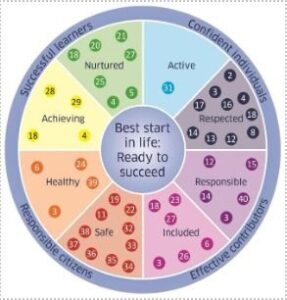
This policy has been written for and by Lainshaw Primary School and has been written in line with East Ayrshire’s Respectful Relationships Framework and takes account of the UN Convention on the Rights of the Child (UNCRC).
Our Vision
At Lainshaw Primary School, we promote positive behaviour and respectful relationships within our environment at all times. Children come to school from a variety of backgrounds, and this is always taken into consideration when supporting the individual needs of pupils.
Our shared vision is to create a safe, healthy and caring environment where everyone has an equal and inclusive range of learning opportunities and is valued, encouraged, motivated and supported to achieve their full potential and aspirations. We show respect, value each other’s views and strive for excellence in partnership with our learning community.
Our Values
Following consultation with pupils, parents, staff, community and partners in November 2019, we agreed on our school values. These are:
✓ Honesty
✓ Kindness
✓ Respect
Our Aims
✓ To create and promote a culture of positive relationships and behaviour
✓ To ensure that all learners are treated fairly and shown respect
✓ To teach appropriate behaviour through positive interventions
✓ To help learners take control over their behaviour and develop self-regulation
✓ To build a community which values positive attitudes and empathy for others
✓ To promote a consistent approach to relationships and behaviour management
✓ To provide simple, practical procedures for staff and learners that ensure consistency
✓ Promote self-esteem and self-discipline
How We Promote Respectful Relationships
At Lainshaw Primary, we believe that a positive learning ethos is key in promoting positive behaviours and learning. We work collaboratively to create this within a nurturing environment. We have clear expectations of what constitutes acceptable behaviour and use a range of effective strategies to promote and value these positive behaviours.
Expectations of Adults
We expect every adult to model positive relationships and promote the following visible consistencies and relentless routines:
Visible Consistencies
✓ Children are greeted as they enter the school every day
✓ Build positive, trusting relationships
✓ Be caring and kind to ourselves and others
✓ Catch children being good
✓ Be relentlessly positive
Relentless Routines
✓ Walk around school
✓ Wear school uniform
✓ Line up smartly inside and out
A positive approach is embedded within the policy.
House System
All children in Lainshaw Primary School are allocated a House when they enter Primary 1. Our Houses are led by our P7 Pupil Leadership teams and include:
✓Boyd
✓Dale
✓Reilly
✓Taylor
Through our house system, children can earn house points by being given ‘purple tokens’ for displaying behaviour which demonstrates the school values and/or UNCRC articles. Children deposit their tokens into the House Boxes in the main entrance of the school. Additionally, every member of staff in the school is given one golden star token per term which is worth 100 House Points! This is given to any child they notice going ‘over and above’ in their behaviour, support of another, recognition of others’ rights etc. The House and Vice Captains are rotated to count the tokens every week. At the end of every term, the winning house receives a special treat afternoon!
Superstar Awards
Every week at our school assemblies, we hand out Superstar Award certificates to pupils who have shown a commitment to demonstrating our termly focus. Each term, we share with children what our focus is going to be e.g. demonstrating a school value and reinforce this expectation at our assemblies. Any member of staff can choose pupils for this award. As a new addition for session 23/24, pupils who receive a Superstar Award will also be invited for ‘Hot Chocolate Friday’ with SMT. Other treats will be available for those who are not hot chocolate fans! This is a special dedicated time where SMT can get a longer opportunity to talk individually with the children and hear about their successes.
Pupil Voice
Part of building respectful relationships in Lainshaw Primary includes valuing, respecting and acting on the views, opinions and ideas of our pupils. To that end, we have a number of Pupil Voice groups in the school including our Pupil Council, Eco Committee, Rights Respecting School Committee and Outdoor Learning Committee. Additionally, every pupil in P7 is invited to apply for a Senior Leadership position to build skills of leading change.
Class Systems
Every class will work collaboratively with their teachers to develop an in-class method of positive recognition. Teachers look to celebrate success in learning, success in respecting the rights of others as outlined in the United Nations Convention on the Rights of the Child and success in demonstrating our school values. Each class has autonomy over this but may include Class Dojo, ‘Special Gems’ or ‘Class Raffle’ to name a few examples.
Health and Wellbeing Framework
Mental and physical health can directly affect our ability to build positive relationships, behave appropriately, develop self-esteem, resilience and self-regulation. At Lainshaw Primary School, we follow the East Ayrshire Council Health and Wellbeing progression planners that focus on helping our pupils be mentally and physically healthy. In addition to this, we also follow the Barnardos PATHS programme which is a universal, evidence-based, social and emotional learning schools programme for 4-11 year olds which empowers all children to develop the fundamental social and emotional learning skills which will enable them to make positive choices throughout life.
Rights Respecting School
Lainshaw Primary School is committed to respecting children’s rights with the UNCRC being a crucial part of daily school life. Children’s rights are explored through class lessons, assemblies and whole school events with children having many opportunities to use their voice to promote change. Please see the figure below which shows how the ‘Getting it Right for Every Child’ Wellbeing indicators align to the range of rights as set out in the UNCRC:

– The numbers are UNCRC articles, please see https://www.unicef.org.uk/what -we-do/un-convention-childrights/ for a summarised version of the UNCRC.
In every class, a class charter is negotiated between pupils and teachers at the beginning of each session. A display is created, showing the UNCRC articles chosen in the class theme. These are monitored and reviewed by the pupils throughout the year. A Whole School Charter is currently in development.
Our Graduated Approach to Challenging/Unacceptable Behaviour
Our priority after a pupil has shown unacceptable behaviour is always to focus on the relationships between all people involved. We adopt a restorative approach in most instances, allow all parties to be heard and help individuals to move forward. As a nurturing school, we believe that a child’s behaviour is communication and as such, we encourage staff to ask these key questions:
- What is happening here?
- What are the possible triggers?
- What is this behaviour communicating?
- What can I do to help?
Ask, Tell, Time Approach
This is a staged approach to helping pupils correct and reflect on unacceptable behaviours. We want our children to understand that we will aim to work out the meaning of their behaviour and understand it but boundaries and consequences for unacceptable behaviour are necessary to help us all feel safe and secure.
Aspects of behaviour that do not meet our Lainshaw Primary School values of ‘Honesty, Kindness and Respect’ have a clear, consistent and logical consequence. The stages reinforce to pupils that they are young and still learning and will therefore be given supportive opportunities to self-correct.
The following pathway will be followed by all staff aiming to redirect pupils showing unacceptable behaviour:
Non-Verbal Reminder
A positive non-verbal encouragement to follow our school values. This can be a look or gesture, closer teacher presence nearby the learner, a finger on the lips etc.
Verbal Reminder
A positive encouragement to follow our school values and show the desired behaviour. Staff will adopt the PACE approach here (Playful, Accepting, Curious and Empathetic) to non-judgementally offer support, ensure the learner has what they need to continue and work out what the root of the behaviour may be.
Ask, Tell, Time
If the reminders are ineffective in supporting the pupil to correct then the ‘Ask, Tell, Time’ approach will then be put into place.
Ask – a clear verbal prompt delivered privately wherever possible, making the learner aware of their unacceptable behaviour with a final request to correct. ‘I am asking you to…’
Tell – a second, clear verbal prompt delivered privately wherever possible with the addition of clearly outlining the consequences if they continue. Learners will be reminded of their previous good conduct to prove that they have been able to make good choices. ‘Now I am telling you to…if this does not happen, we will move to a consequence.’
Time – if the pupil has not been able to correct the unacceptable behaviour, it is likely that they have disrupted learning or play time for themselves and others. We promote logical consequences, so at this point the pupil will be required to attend ‘Reflection Time In’ with a member of teaching staff for either 5 minutes at play time or 5 minutes at lunch time. An email will also be sent home to the parent/carer that day to inform them of this and the reason for ‘Reflection Time In’ so they can have a follow-up discussion at home.
*Pupils will be given a fresh start each day with previous days’ behaviour not held over them. However, if a pupil moves through all the stages of the ‘Ask, Tell, Time’ approach 3 times in one week, a member of the Senior Management Team will call the pupil’s parent or carer to discuss a more detailed action plan of support.
* Some behaviours, including violence, will be directed to SMT immediately.
Escalations to SMT (PT~DHT~HT)
In the circumstance where a child has gone through the steps of the ‘Ask, Tell, Time’ approach in one day and persists with unacceptable behaviour, it will be appropriate for the Senior Management Team to be informed. Usually, the pupil will meet with SMT to discuss and reflect on their behaviour with clear actions and consequences agreed. The member of SMT working with the pupil will then call parents/carers to inform that this has taken place. If appropriate, a restorative conversation will take place with any other affected parties involving the following questions:
- What happened?
- What were you thinking at the time?
- What have you thought since?
- How did this make people feel?
- Who has been affected?
- How have they been affected?
- What should we do to put things right?
- How can we do things differently in the future?
In The Playground/Support Staff
Our Support Staff were fully included in the development of this policy and will enact and apply the vision, values and aims as teaching staff will. Any incidences of unacceptable behaviour in the playground will be reported to the class teacher at the end of the break time. This allows the teacher to consider the behaviour within the context of the child’s behaviour across the full day. Support Staff may utilise ‘cool off’ times in the playground to allow them to investigate and de-escalate situations. A member of SMT is always available in each playground for further support.
Individual Support Plans
Some children struggle more than others with regulated, calm and appropriate behaviour. This can be for a number of reasons including but not limited to trauma, adverse childhood experiences and neuro-diversity. To support these pupils, the DHT or HT will work collaboratively with families and outside agencies where necessary to develop individual plans that help the child to develop and apply the skills they need to behave in a way that is safe, regulated and enables them to experience success.
Exclusion
In some exceptional cases of inappropriate behaviour, the Senior Management Team may feel it necessary to exclude individual pupils, resulting in pupils being absent from school. We strive to keep such incidents to a minimum, however, where it is necessary, East Ayrshire’s Standard Circular 8 is followed.

